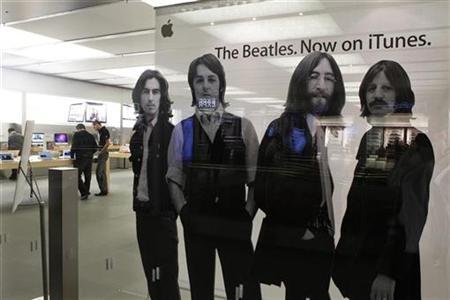Center
Beatles being paid directly by iTunes in deal
Updated: 2011-01-07 09:16
(Agencies)

NEW YORK - It seems that the EMI/Beatles deal that finally brought the Fab Four's catalog to iTunes may be more groundbreaking than originally thought.
According to industry sources, iTunes is paying the Beatles' royalties from digital download sales in the United States directly to the band's company, Apple Corps, and is paying the songwriting mechanical royalties directly to Sony/ATV Music Publishing, which controls most of the Beatles' song catalog.
That suggests the royalty split could be more lucrative for the Beatles than it would be under the typical provisions of a standard artist contract, which treat digital downloads as a retail sale.
Under a standard contract, a label issues an album, licenses the songs from music publishers, collects all wholesale revenue from the retailers and then distributes royalties to the artist and the publisher.
For superstar artists, the royalty typically equals about 20%-25% of retail revenue. So in the case of iTunes' Beatles sales, where tracks are sold to the merchant for about 90 cents and are retailed for $1.29, a standard contract with a typical superstar royalty rate of 20%-25% would pay the Beatles about 18 cents to 22.5 cents per track sale.
But because iTunes is making royalty payments to the Beatles and Sony/ATV, EMI may be treating its deal with the digital retailer as a licensing pact.
Under such deals, the licensee pays mechanical royalties directly to a publisher and revenue from use of a master recording is split evenly between an artist and a label, making it far more lucrative for the artist than a standard artist contract.
An EMI spokesman declined to comment, as did Sony/ATV and representatives at Apple Corps and iTunes. And a high-placed source familiar with the deal insists that it's "absolutely incorrect" that the agreement between EMI and Apple Corps is a licensing deal.
However one describes the EMI-iTunes deal for the Beatles' catalog, its similarities to a licensing pact put it at the center of a heated debate over the nature of download sales.
Since the dawn of the digital age, artists, managers and labels have wrangled over whether a digital download purchase should be considered a licensed use of a master recording or a retail sale, much like the sale of a CD. Labels, of course, insist the latter designation is correct and have paid artist royalties accordingly.
But some recording acts, like Cheap Trick and the Allman Brothers, have taken their labels to court claiming that sales of their downloads should be treated as licensing deals. While Cheap Trick ultimately settled with Sony, the Allman Brothers case is still ongoing.
In another closely watched case, the U.S. Court of Appeals for the Ninth Circuit in September voided a jury's decision on the royalty split issue that was favorable to Universal Music Group and against F.B.T., the music company that Eminem was originally signed to before Universal picked up his contract.
F.B.T. maintains that a digital download represents a licensing deal, which requires the higher royalty split. With the case sent back to the original court, UMG has filed a petition for the U.S. Supreme Court to review the lower court's decision.
In addition to a potentially much more lucrative royalty rate, iTunes' direct payment of U.S. royalties to the Beatles and Sony/ATV would give the band greater accounting transparency over their iTunes sales than they would if EMI distributed the royalties.
Other label/superstar contract negotiations have resulted in far costlier give-backs -- for example, acts like AC/DC and Garth Brooks negotiated the return of their master rights.
Still, whether the agreement that put the Beatles on iTunes is a licensing deal or not, it's still significant that the Fab Four and their publisher are being paid directly by iTunes.
U.S. music publishers lament that labels treat an iTunes download as a retail sale, because they want to be paid directly by any U.S. digital retailer selling downloads, rather than by a label.
Likewise, it would be a singular deal, label and publishing sources say, for an artist on a label to be paid directly by the retailer for the sale of the artist's music.
In practically every other known instance, the retailer pays the label, which in turn pays the artist royalty.
E-paper

Ear We Go
China and the world set to embrace the merciful, peaceful year of rabbit
Preview of the coming issue
Carrefour finds the going tough in China
Maid to Order
Specials

Mysteries written in blood
Historical records and Caucasian features of locals suggest link with Roman Empire.

Winning Charm
Coastal Yantai banks on little things that matter to grow

New rules to hit property market
The State Council launched a new round of measures to rein in property prices.
